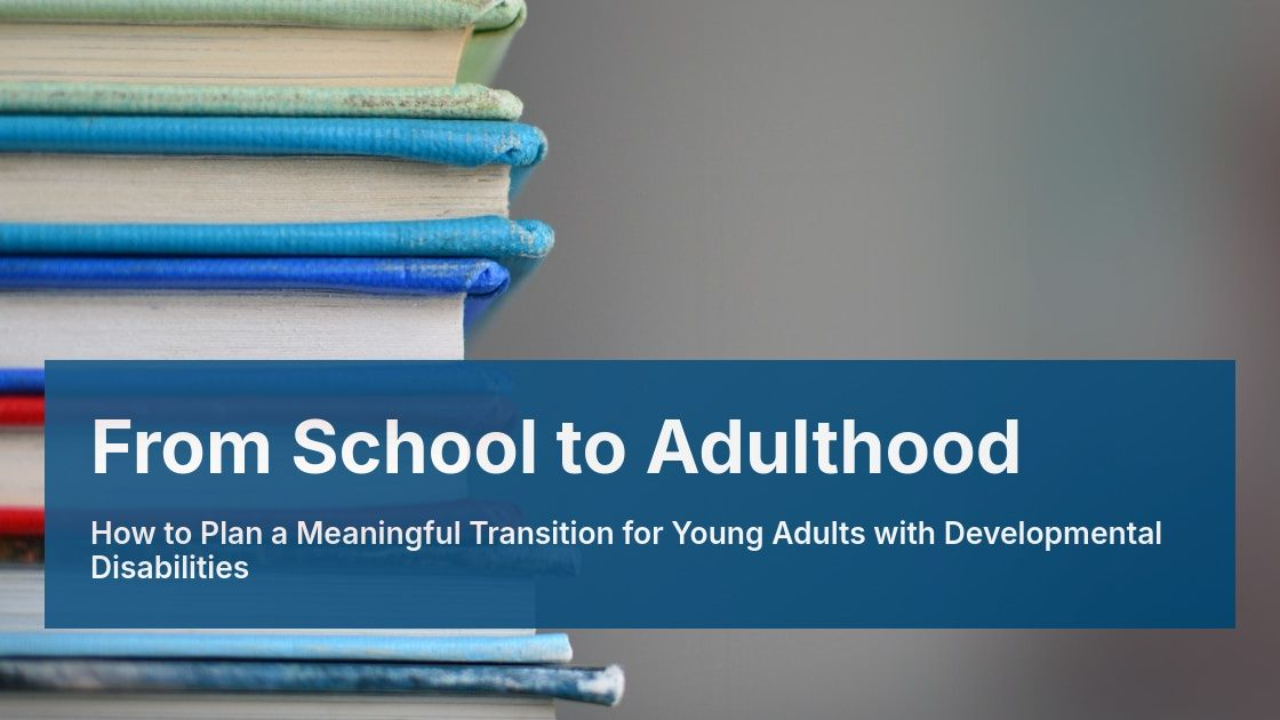From School to Adulthood: How to Plan a Meaningful Transition for Young Adults with Developmental Disabilities

The move from high school to adulthood can feel exciting, overwhelming, and uncertain—all at once. If you’re the parent or caregiver of a young adult with a developmental disability, you may be asking:
-
What happens after the school bus stops coming?
-
Will they have opportunities to work, live independently, and build a fulfilling life?
-
How do I make sure they’re not just safe—but truly thriving?
These are big questions—but you don’t have to face them alone. With person-centered planning, the transition to adulthood can be a time of discovery, empowerment, and growth—for your child and your family.
Here’s how to start planning a meaningful transition that honors your young adult’s strengths, dreams, and future.
What Is the Transition to Adulthood?
In California and across the U.S., schools are required to begin transition planning by age 16 (or earlier, if needed). This planning should be part of your child’s IEP (Individualized Education Program) and focus on life after high school, including:
-
Post-secondary education
-
Employment
-
Independent or supported living
-
Community involvement
-
Self-determination and decision-making skills
The goal? To create a bridge—not a cliff—from school to the adult world.
1. Start with the Person, Not the System
Too often, transition plans start with what programs are available, not what the person wants.
Person-Centered Planning flips the script by asking:
-
What does your young adult want for their future?
-
What are their interests, gifts, and passions?
-
What does a good life look like—for them?
Tools like a Person-Centered Profile or MAPS/PATH planning session can help bring these visions to life.
2. Build Skills for Independence—Step by Step
Independence doesn’t look the same for everyone—and that’s okay. The key is building real-life skills in everyday settings. This might include:
-
Learning to cook simple meals
-
Practicing using public transportation
-
Managing a daily routine or schedule
-
Understanding how to ask for help
-
Exploring choices about money, privacy, or relationships
Every small step adds up—and the earlier you start, the better.
3. Explore Employment Options Early
Work is more than a paycheck—it’s purpose, connection, and growth.
Talk with your IEP team about:
-
WorkAbility or Transition Partnership Programs (TPP)
-
Internships or volunteer opportunities
-
Job exploration and vocational assessments
-
Soft skills training (interviewing, time management, etc.)
After high school, your Regional Center can also support employment goals through competitive integrated employment services or tailored day programs.
And remember: Employment is possible for many young adults with developmental disabilities—with the right supports.
4. Get to Know Adult Services Before Graduation
Transitioning into adult systems (like the Regional Center or Department of Rehabilitation) can take time and coordination. Don’t wait until the last minute.
Start exploring:
-
The Self-Determination Program (for flexible, person-led supports)
-
Independent Living Services (ILS)
-
Supported Living Services (SLS)
-
Post-secondary education programs for students with disabilities
-
Social/recreation programs that build community and inclusion
Ask your IEP team to invite Regional Center representatives to IEP meetings before age 18.
5. Empower Your Young Adult with Voice and Choice
Your child is becoming an adult—and they deserve to be treated as one. That includes:
-
Involving them in their own meetings
-
Encouraging self-advocacy
-
Exploring Supported Decision-Making as an alternative to conservatorship
-
Helping them speak up about what they want (and don’t want)
This is their life. The more they practice decision-making now, the more confident they’ll be in the future.
6. Create a Vision Plan for the Future
One of the most powerful tools in transition planning is a vision statement or “Good Life Plan.” It helps anchor all your decisions in what truly matters.
Try this prompt:
“Five years from now, I see myself/my child living… working… spending time with… learning… feeling…”
This vision can guide your IEP, IPP, and community supports. It reminds everyone: We’re not planning for programs. We’re planning for a life.
The transition to adulthood doesn’t have to be a leap into the unknown. With thoughtful, person-centered planning, it can be a hopeful and exciting journey—where your loved one explores who they are, what they want, and how they want to live.
And you don’t have to figure it all out at once. Step by step, connection by connection, you can build a path forward—together.
Need support creating a meaningful transition plan?
Let’s work together to design a future rooted in choice, community, and self-determination. Book a free consultation to start shaping a plan that fits your young adult’s life and vision.
Because adulthood is not a destination—it’s a launchpad. Let’s help them soar.
Book a Free Advocacy & Planning Call
If you’re curious about how we can help your loved one, let’s talk! In this free 30-minute call, we’ll:
💬 Talk about your loved one’s passions and strengths
💬 Explore possible ideas
💬 Identify first steps to turning a dream into reality

